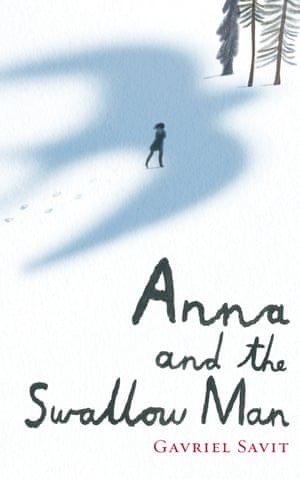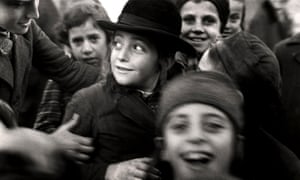
On International Holocaust Memorial Day, Gavriel Savit urges all of us to consider the people, the individual human beings, behind the horrifying figure of six million - the number of Jews murdered during the Holocaust
Jewish school children in Mukacevo, Ukraine in a photo by Roman Vishniac, a Russian-born Jew who immigrated to Berlin in 1920 and documented the ominous rise of Nazi power and its effect on everyday Jewish life in Central and Eastern Europe. Photograph: AP Photo/International Center of Photography, United States Holocaust Memorial Museum, Roman Vishniac
Today is International Holocaust Memorial Day.
Tomorrow, my book, Anna and the Swallow Man, which takes place in Poland during the second world war, will be released in the UK, and because there’s some overlap between the subject matter of my book and the horrific events that we remember today, I’ve been asked to share my thoughts on the occasion.
I’ll try.
Here’s what I think:
Certain words and concepts are frankly unavoidable when we come to consider the Holocaust:
Ghetto.
Concentration camp.
Gas chamber.
They’re familiar. We know what to envision when we hear or read those words. We know how to feel.
Perhaps the most immediate association for me, the first word or phrase that I think of among that range is this one: six million.
Six million. For me, the number of Jews murdered during the Holocaust is so indelibly bound up in association with that event that I can’t manage to hear the number mentioned - no matter what the specific context - without a momentary, familiar, almost banal flash of horror.
Six million.
Gas chamber.
Concentration camp.
Ghetto.
There they are, those words and concepts, familiar, like old photographs hung on the wall of the long, gently curving, circular corridor of the year.
We arrive before them each Holocaust Memorial Day.
We pause. We doff our hats. We pay our respects.
And this is, of course, proper. This is what the name of the day invites us to do - after all, the word memorial brings to mind huge stone monoliths, obelisks, triumphal arches. If individuals are implicated here at all, it’s only in their capacity as chiselled names in the marble - singular, each, but alike in their neat rows and columns, cut into the stone in precisely the same orderly roman capitals.
Uniformed, almost.
But this grand, formalised method of remembering, this ritual pausing to bow the head in front of the memorial - I think this is, in some ways, at odds with six million. Remember - six million is not the complete thought: it’s six millionindividual human beings. They weren’t monolithic. They weren’t uniform. They were people- many, many, many, many people - and people have a way of being themselves.
Consider: if you woke just before the midnight that divides International Holocaust Memorial Day from its preceding neighbour, and, upon the stroke of 12, you began to devote one successive second - one single, bare, tiny, fleeting, stupid second - to thinking of an individual casualty of the Holocaust, you would reach the day’s closing midnight, twenty-four full hours later, without having come anywhere near to completing the task. Even if we give only a second of our time to each person, we can’t reach them all today. We simply can’t. It’s impossible.
It’s for precisely this reason that I think it’s so important to try.
And so I invite you now: let’s try not to think of the same old words and phrases and images we always call to mind - the barbed wire, the yellow star, the Arbeit macht frei - instead, let’s try to think of human beings. Individuals.
There were six million of them.
It stands to reason that some must’ve shared a name. How many Rachel Cohens? How many Moshe ben Dovids?
Some of them must’ve woken in the morning thinking that they wouldn’t live out the day, and some of them must’ve been right. Do you think, in the final moments, as the muzzle of the pistol was raised or the room filled up with gas, that it was any comfort to have known? To have been right?
I’ll bet for some, weirdly, it was.
Someone must’ve argued with her husband in the morning as she set off to do her errands - her shopping, her visiting, her walk around the neighbourhood. Someone must’ve wished she had said something different, kinder, softer, the last time she saw him, even if she was still mad.
And some of them must’ve laughed. There must’ve been some who were so frightened and confused and uncomfortable that they cracked jokes to their neighbour in order to release the tension. There’s always one wise guy in the group, isn’t there? Waiting in the line for death, there, or hopping down from a train car for the last time, someone must’ve made a stupid joke; there were, after all, six million opportunities.
By the same token, there must’ve been some real jerks among the slaughtered, some people who you wouldn’t have wanted to spend 20 minutes in conversation with - just not nice people. There had to have been. Because there were so many. And they were people.
Who was hungry? Many, I’m sure.
Who was uncomfortably full? There must’ve been some.
Who had a song stuck in her head?
Who had just remembered something he’d forgotten to do?
How many needed to use the toilet?
How many died among friends?
How many among strangers?
How many never saw it coming, distracted by the beauty of the day?
Because days were still beautiful, during the Holocaust, sometimes. The sun still rose and shone and set, every single day, as it did yesterday, will do tomorrow, and does here, now, today.
Today is International Holocaust Memorial Day.
Tomorrow, my book, Anna and the Swallow Man, which takes place in Poland during the second world war, will be released in the UK, and because there’s some overlap between the subject matter of my book and the horrific events that we remember today, I’ve been asked to share my thoughts on the occasion.
I’ll try.
Here’s what I think:
Certain words and concepts are frankly unavoidable when we come to consider the Holocaust:
Ghetto.
Concentration camp.
Gas chamber.
They’re familiar. We know what to envision when we hear or read those words. We know how to feel.
Perhaps the most immediate association for me, the first word or phrase that I think of among that range is this one: six million.
Six million. For me, the number of Jews murdered during the Holocaust is so indelibly bound up in association with that event that I can’t manage to hear the number mentioned - no matter what the specific context - without a momentary, familiar, almost banal flash of horror.
Six million.
Gas chamber.
Concentration camp.
Ghetto.
There they are, those words and concepts, familiar, like old photographs hung on the wall of the long, gently curving, circular corridor of the year.
We arrive before them each Holocaust Memorial Day.
We pause. We doff our hats. We pay our respects.
And this is, of course, proper. This is what the name of the day invites us to do - after all, the word memorial brings to mind huge stone monoliths, obelisks, triumphal arches. If individuals are implicated here at all, it’s only in their capacity as chiselled names in the marble - singular, each, but alike in their neat rows and columns, cut into the stone in precisely the same orderly roman capitals.
Uniformed, almost.
But this grand, formalised method of remembering, this ritual pausing to bow the head in front of the memorial - I think this is, in some ways, at odds with six million. Remember - six million is not the complete thought: it’s six millionindividual human beings. They weren’t monolithic. They weren’t uniform. They were people- many, many, many, many people - and people have a way of being themselves.
Consider: if you woke just before the midnight that divides International Holocaust Memorial Day from its preceding neighbour, and, upon the stroke of 12, you began to devote one successive second - one single, bare, tiny, fleeting, stupid second - to thinking of an individual casualty of the Holocaust, you would reach the day’s closing midnight, twenty-four full hours later, without having come anywhere near to completing the task. Even if we give only a second of our time to each person, we can’t reach them all today. We simply can’t. It’s impossible.
It’s for precisely this reason that I think it’s so important to try.
And so I invite you now: let’s try not to think of the same old words and phrases and images we always call to mind - the barbed wire, the yellow star, the Arbeit macht frei - instead, let’s try to think of human beings. Individuals.
There were six million of them.
It stands to reason that some must’ve shared a name. How many Rachel Cohens? How many Moshe ben Dovids?
Some of them must’ve woken in the morning thinking that they wouldn’t live out the day, and some of them must’ve been right. Do you think, in the final moments, as the muzzle of the pistol was raised or the room filled up with gas, that it was any comfort to have known? To have been right?
I’ll bet for some, weirdly, it was.
Someone must’ve argued with her husband in the morning as she set off to do her errands - her shopping, her visiting, her walk around the neighbourhood. Someone must’ve wished she had said something different, kinder, softer, the last time she saw him, even if she was still mad.
And some of them must’ve laughed. There must’ve been some who were so frightened and confused and uncomfortable that they cracked jokes to their neighbour in order to release the tension. There’s always one wise guy in the group, isn’t there? Waiting in the line for death, there, or hopping down from a train car for the last time, someone must’ve made a stupid joke; there were, after all, six million opportunities.
By the same token, there must’ve been some real jerks among the slaughtered, some people who you wouldn’t have wanted to spend 20 minutes in conversation with - just not nice people. There had to have been. Because there were so many. And they were people.
Who was hungry? Many, I’m sure.
Who was uncomfortably full? There must’ve been some.
Who had a song stuck in her head?
Who had just remembered something he’d forgotten to do?
How many needed to use the toilet?
How many died among friends?
How many among strangers?
How many never saw it coming, distracted by the beauty of the day?
Because days were still beautiful, during the Holocaust, sometimes. The sun still rose and shone and set, every single day, as it did yesterday, will do tomorrow, and does here, now, today.

And so today, this International Holocaust Memorial Day, do me this favour, if you would - find one moment, one common, ordinary moment of human experience in which to think this thought:
How many were doing this thing that I do here in this moment?
How many were exactly as I am now?
(The Guardian)



No comments:
Post a Comment